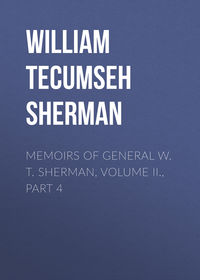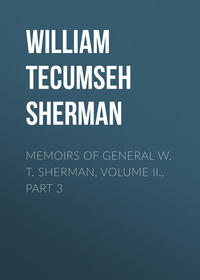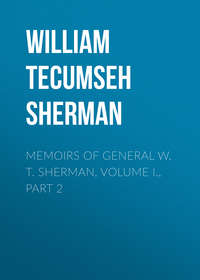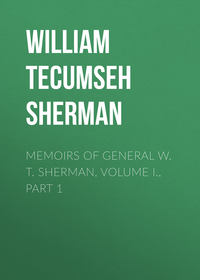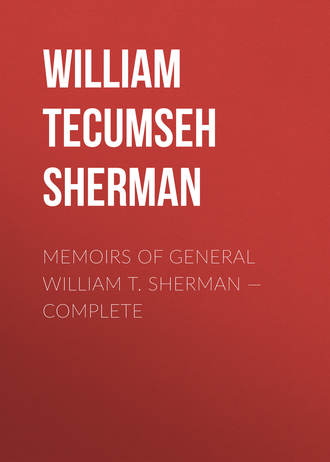 полная версия
полная версияMemoirs of General William T. Sherman — Complete
Stevenson'a regiment reached San Francisco Bay early in March, 1847. Three companies were stationed at the Presidio under Major James A. Hardier one company (Brackett's) at Sonoma; three, under Colonel Stevenson, at Monterey; and three, under Lieutenant-Colonel Burton, at Santa Barbara. One day I was down at the headquarters at Larkin's horse, when General Kearney remarked to me that he was going down to Los Angeles in the ship Lexington, and wanted me to go along as his aide. Of course this was most agreeable to me. Two of Stevenson's companies, with the headquarters and the colonel, were to go also. They embarked, and early in May we sailed for San Pedro. Before embarking, the United States line-of-battle-ship Columbus had reached the coast from China with Commodore Biddle, whose rank gave him the supreme command of the navy on the coast. He was busy in calling in—"lassooing "—from the land-service the various naval officers who under Stockton had been doing all sorts of military and civil service on shore. Knowing that I was to go down the coast with General Kearney, he sent for me and handed me two unsealed parcels addressed to Lieutenant Wilson, United States Navy, and Major Gillespie, United States Marines, at Los Angeles. These were written orders pretty much in these words: "On receipt of this order you will repair at once on board the United States ship Lexington at San Pedro, and on reaching Monterey you will report to the undersigned.-JAMES BIDDLE." Of course, I executed my part to the letter, and these officers were duly "lassooed." We sailed down the coast with a fair wind, and anchored inside the kelp, abreast of Johnson's house. Messages were forthwith dispatched up to Los Angeles, twenty miles off, and preparations for horses made for us to ride up. We landed, and, as Kearney held to my arm in ascending the steep path up the bluff, he remarked to himself, rather than to me, that it was strange that Fremont did not want to return north by the Lexington on account of sea-sickness, but preferred to go by land over five hundred miles. The younger officers had been discussing what the general would do with Fremont, who was supposed to be in a state of mutiny. Some, thought he would be tried and shot, some that he would be carried back in irons; and all agreed that if any one else than Fremont had put on such airs, and had acted as he had done, Kearney would have shown him no mercy, for he was regarded as the strictest sort of a disciplinarian. We had a pleasant ride across the plain which lies between the seashore and Los Angeles, which we reached in about three hours, the infantry following on foot. We found Colonel P. St. George Cooke living at the house of a Mr. Pryor, and the company of dragoons, with A. J. Smith, Davidson, Stoneman, and Dr. Griffin, quartered in an adobe-house close by. Fremont held his court in the only two-story frame-house in the place. After sometime spent at Pryor's house, General Kearney ordered me to call on Fremont to notify him of his arrival, and that he desired to see him. I walked round to the house which had been pointed out to me as his, inquired of a man at the door if the colonel was in, was answered "Yea," and was conducted to a large room on the second floor, where very soon Fremont came in, and I delivered my message. As I was on the point of leaving, he inquired where I was going to, and I answered that I was going back to Pryor's house, where the general was, when he remarked that if I would wait a moment he would go along. Of course I waited, and he soon joined me, dressed much as a Californian, with the peculiar high, broad-brimmed hat, with a fancy cord, and we walked together back to Pryor's, where I left him with General Kearney. We spent several days very pleasantly at Los Angeles, then, as now, the chief pueblo of the south, famous for its grapes, fruits, and wines. There was a hill close to the town, from which we had a perfect view of the place. The surrounding country is level, utterly devoid of trees, except the willows and cotton-woods that line the Los Angeles Creek and the acequias, or ditches, which lead from it. The space of ground cultivated in vineyards seemed about five miles by one, embracing the town. Every house had its inclosure of vineyard, which resembled a miniature orchard, the vines being very old, ranged in rows, trimmed very close, with irrigating ditches so arranged that a stream of water could be diverted between each row of vines. The Los Angeles and San Gabriel Rivers are fed by melting snows from a range of mountains to the east, and the quantity of cultivated land depends upon the amount of water. This did not seem to be very large; but the San Gabriel River, close by, was represented to contain a larger volume of water, affording the means of greatly enlarging the space for cultivation. The climate was so moderate that oranges, figs, pomegranates, etc.... were generally to be found in every yard or inclosure.
At the time of our visit, General Kearney was making his preparations to return overland to the United States, and he arranged to secure a volunteer escort out of the battalion of Mormons that was then stationed at San Luis Rey, under Colonel Cooke and a Major Hunt. This battalion was only enlisted for one year, and the time for their discharge was approaching, and it was generally understood that the majority of the men wanted to be discharged so as to join the Mormons who had halted at Salt Lake, but a lieutenant and about forty men volunteered to return to Missouri as the escort of General Kearney. These were mounted on mules and horses, and I was appointed to conduct them to Monterey by land. Leaving the party at Los Angeles to follow by sea in the Lexington, I started with the Mormon detachment and traveled by land. We averaged about thirty miles a day, stopped one day at Santa Barbara, where I saw Colonel Burton, and so on by the usually traveled road to Monterey, reaching it in about fifteen days, arriving some days in advance of the Lexington. This gave me the best kind of an opportunity for seeing the country, which was very sparsely populated indeed, except by a few families at the various Missions. We had no wheeled vehicles, but packed our food and clothing on mules driven ahead, and we slept on the ground in the open air, the rainy season having passed. Fremont followed me by land in a few days, and, by the end of May, General Kearney was all ready at Monterey to take his departure, leaving to succeed him in command Colonel R. B. Mason, First Dragoons. Our Captain (Tompkins), too, had become discontented at his separation from his family, tendered his resignation to General Kearney, and availed himself of a sailing-vessel bound for Callao to reach the East. Colonel Mason selected me as his adjutant-general; and on the very last day of May General Kearney, with his Mormon escort, with Colonel Cooke, Colonel Swords (quartermaster), Captain Turner, and a naval officer, Captain Radford, took his departure for the East overland, leaving us in full possession of California and its fate. Fremont also left California with General Kearney, and with him departed all cause of confusion and disorder in the country. From that time forth no one could dispute the authority of Colonel Mason as in command of all the United States forces on shore, while the senior naval officer had a like control afloat. This was Commodore James Biddle, who had reached the station from China in the Columbus, and he in turn was succeeded by Commodore T. Ap Catesby Jones in the line-of-battle-ship Ohio. At that time Monterey was our headquarters, and the naval commander for a time remained there, but subsequently San Francisco Bay became the chief naval rendezvous.
Colonel R. B. Mason, First Dragoons, was an officer of great experience, of stern character, deemed by some harsh and severe, but in all my intercourse with him he was kind and agreeable. He had a large fund of good sense, and, during our long period of service together, I enjoyed his unlimited confidence. He had been in his day a splendid shot and hunter, and often entertained me with characteristic anecdotes of Taylor, Twiggs, Worth, Harvey, Martin Scott, etc., etc, who were then in Mexico, gaining a national fame. California had settled down to a condition of absolute repose, and we naturally repined at our fate in being so remote from the war in Mexico, where our comrades were reaping large honors. Mason dwelt in a house not far from the Custom-House, with Captain Lanman, United States Navy; I had a small adobe-house back of Larkin's. Halleck and Dr. Murray had a small log-house not far off. The company of artillery was still on the hill, under the command of Lieutenant Ord, engaged in building a fort whereon to mount the guns we had brought out in the Lexington, and also in constructing quarters out of hewn pine-logs for the men. Lieutenant Minor, a very clever young officer, had taken violently sick and died about the time I got back from Los Angeles, leaving Lieutenants Ord and Loeser alone with the company, with Assistant-Surgeon Robert Murray. Captain William G. Marcy was the quartermaster and commissary. Naglee's company of Stevenson's regiment had been mounted and was sent out against the Indians in the San Joaquin Valley, and Shannon's company occupied the barracks. Shortly after General Kearney had gone East, we found an order of his on record, removing one Mr. Nash, the Alcalde of Sonoma, and appointing to his place ex-Governor L. W. Boggs. A letter came to Colonel and Governor Mason from Boggs, whom he had personally known in Missouri, complaining that, though he had been appointed alcalde, the then incumbent (Nash) utterly denied Kearney's right to remove him, because he had been elected by the people under the proclamation of Commodore Sloat, and refused to surrender his office or to account for his acts as alcalde. Such a proclamation had been made by Commodore Sloat shortly after the first occupation of California, announcing that the people were free and enlightened American citizens, entitled to all the rights and privileges as such, and among them the right to elect their own officers, etc. The people of Sonoma town and valley, some forty or fifty immigrants from the United States, and very few native Californians, had elected Mr. Nash, and, as stated, he refused to recognize the right of a mere military commander to eject him and to appoint another to his place. Neither General Kearney nor Mason had much respect for this land of "buncombe," but assumed the true doctrine that California was yet a Mexican province, held by right of conquest, that the military commander was held responsible to the country, and that the province should be held in statu quo until a treaty of peace. This letter of Boggs was therefore referred to Captain Brackett, whose company was stationed at Sonoma, with orders to notify Nash that Boggs was the rightful alcalde; that he must quietly surrender his office, with the books and records thereof, and that he must account for any moneys received from the sale of town-lots, etc., etc.; and in the event of refusal he (Captain Brackett) must compel him by the use of force. In due time we got Brackett's answer, saying that the little community of Sonoma was in a dangerous state of effervescence caused by his orders; that Nash was backed by most of the Americans there who had come across from Missouri with American ideas; that as he (Brackett) was a volunteer officer, likely to be soon discharged, and as he designed to settle there, he asked in consequence to be excused from the execution of this (to him) unpleasant duty. Such a request, coming to an old soldier like Colonel Mason, aroused his wrath, and he would have proceeded rough-shod against Brackett, who, by-the-way, was a West Point graduate, and ought to have known better; but I suggested to the colonel that, the case being a test one, he had better send me up to Sonoma, and I would settle it quick enough. He then gave me an order to go to Sonoma to carry out the instructions already given to Brackett.
I took one soldier with me, Private Barnes, with four horses, two of which we rode, and the other two we drove ahead. The first day we reached Gilroy's and camped by a stream near three or four adobe-huts known as Gilroy's ranch. The next day we passed Murphy's, San Jose, and Santa Clara Mission, camping some four miles beyond, where a kind of hole had been dug in the ground for water. The whole of this distance, now so beautifully improved and settled, was then scarcely occupied, except by poor ranches producing horses and cattle. The pueblo of San Jose was a string of low adobe-houses festooned with red peppers and garlic; and the Mission of Santa Clara was a dilapidated concern, with its church and orchard. The long line of poplar-trees lining the road from San Jose to Santa Clara bespoke a former period when the priests had ruled the land. Just about dark I was lying on the ground near the well, and my soldier Barnes had watered our horses and picketed them to grass, when we heard a horse crushing his way through the high mustard-bushes which filled the plain, and soon a man came to us to inquire if we had seen a saddle-horse pass up the road. We explained to him what we had heard, and he went off in pursuit of his horse. Before dark he came back unsuccessful, and gave his name as Bidwell, the same gentleman who has since been a member of Congress, who is married to Miss Kennedy, of Washington City, and now lives in princely style at Chico, California.
He explained that he was a surveyor, and had been in the lower country engaged in surveying land; that the horse had escaped him with his saddle-bags containing all his notes and papers, and some six hundred dollars in money, all the money he had earned. He spent the night with us on the ground, and the next morning we left him there to continue the search for his horse, and I afterward heard that he had found his saddle-bags all right, but never recovered the horse. The next day toward night we approached the Mission of San Francisco, and the village of Yerba Buena, tired and weary—the wind as usual blowing a perfect hurricane, and a more desolate region it was impossible to conceive of. Leaving Barnes to work his way into the town as best he could with the tired animals, I took the freshest horse and rode forward. I fell in with Lieutenant Fabius Stanley, United States Navy, and we rode into Yerba Buena together about an hour before sundown, there being nothing but a path from the Mission into the town, deep and heavy with drift-sand. My horse could hardly drag one foot after the other when we reached the old Hudson Bay Company's house, which was then the store of Howard and Mellus. There I learned where Captain Folsom, the quartermaster, was to be found. He was staying with a family of the name of Grimes, who had a small horse back of Howard's store, which must have been near where Sacramento Street now crosses Kearney. Folsom was a classmate of mine, had come out with Stevenson's regiment as quartermaster, and was at the time the chief-quartermaster of the department. His office was in the old custom-horse standing at the northwest corner of the Plaza. He had hired two warehouses, the only ones there at the time, of one Liedsdorff, the principal man of Yerba Buena, who also owned the only public-house, or tavern, called the City Hotel, on Kearney Street, at the southeast corner of the Plaza. I stopped with Folsom at Mrs. Grimes's, and he sent my horse, as also the other three when Barnes had got in after dark, to a coral where he had a little barley, but no hay. At that time nobody fed a horse, but he was usually turned out to pick such scanty grass as he could find on the side-hills. The few government horses used in town were usually sent out to the Presidio, where the grass was somewhat better. At that time (July, 1847), what is now called San Francisco was called Yerba Buena. A naval officer, Lieutenant Washington A. Bartlett, its first alcalde, had caused it to be surveyed and laid out into blocks and lots, which were being sold at sixteen dollars a lot of fifty vuras square; the understanding being that no single person could purchase of the alcalde more than one in-lot of fifty varas, and one out-lot of a hundred varas. Folsom, however, had got his clerks, orderlies, etc., to buy lots, and they, for a small consideration, conveyed them to him, so that he was nominally the owner of a good many lots. Lieutenant Halleck had bought one of each kind, and so had Warner. Many naval officers had also invested, and Captain Folsom advised me to buy some, but I felt actually insulted that he should think me such a fool as to pay money for property in such a horrid place as Yerba Buena, especially ridiculing his quarter of the city, then called Happy Valley. At that day Montgomery Street was, as now, the business street, extending from Jackson to Sacramento, the water of the bay leaving barely room for a few houses on its east side, and the public warehouses were on a sandy beach about where the Bank of California now stands, viz., near the intersection of Sansome and California, Streets. Along Montgomery Street were the stores of Howard & Mellus, Frank Ward, Sherman & Ruckel, Ross & Co., and it may be one or two others. Around the Plaza were a few houses, among them the City Hotel and the Custom-House, single-story adobes with tiled roofs, and they were by far the most substantial and best houses in the place. The population was estimated at about four hundred, of whom Kanakas (natives of the Sandwich Islands) formed the bulk.
At the foot of Clay Street was a small wharf which small boats could reach at high tide; but the principal landing-place was where some stones had fallen into the water, about where Broadway now intersects Battery Street. On the steep bluff above had been excavated, by the navy, during the year before, a bench, wherein were mounted a couple of navy-guns, styled the battery, which, I suppose, gave name to the street. I explained to Folsom the object of my visit, and learned from him that he had no boat in which to send me to Sonoma, and that the only, chance to get there was to borrow a boat from the navy. The line-of-battle-ship Columbus was then lying at anchor off the town, and he said if I would get up early the next morning I could go off to her in one of the market-boats.
Accordingly, I was up bright and early, down at the wharf, found a boat, and went off to the Columbus to see Commodore Biddle. On reaching the ship and stating to the officer of the deck my business, I was shown into the commodore's cabin, and soon made known to him my object. Biddle was a small-sized man, but vivacious in the extreme. He had a perfect contempt for all humbug, and at once entered into the business with extreme alacrity. I was somewhat amused at the importance he attached to the step. He had a chaplain, and a private secretary, in a small room latticed off from his cabin, and he first called on them to go out, and, when we were alone, he enlarged on the folly of Sloat's proclamation, giving the people the right to elect their own officers, and commended Kearney and Mason for nipping that idea in the bud, and keeping the power in their own hands. He then sent for the first lieutenant (Drayton), and inquired if there were among the officers on board any who had ever been in the Upper Bay, and learning that there was a midshipman (Whittaker) he was sent for. It so happened that this midshipman had been on a frolic on shore a few nights before, and was accordingly much frightened when summoned into the commodore's presence, but as soon as he was questioned as to his knowledge of the bay, he was sensibly relieved, and professed to know every thing about it.
Accordingly, the long boat was ordered with this midshipman and eight sailors, prepared with water and provisions for several days absence. Biddle then asked me if I knew any of his own officers, and which one of them I would prefer to accompany me. I knew most of them, and we settled down on Louis McLane. He was sent for, and it was settled that McLane and I were to conduct this important mission, and the commodore enjoined on us complete secrecy, so as to insure success, and he especially cautioned us against being pumped by his ward-room officers, Chapman, Lewis, Wise, etc., while on board his ship. With this injunction I was dismissed to the wardroom, where I found Chapman, Lewis, and Wise, dreadfully exercised at our profound secrecy. The fact that McLane and I had been closeted with the commodore for an hour, that orders for the boat and stores had been made, that the chaplain and clerk had been sent out of the cabin, etc., etc., all excited their curiosity; but McLane and I kept our secret well. The general impression was, that we had some knowledge about the fate of Captain Montgomery's two sons and the crew that had been lost the year before. In 1846 Captain Montgomery commanded at Yerba Buena, on board the St. Mary sloop-of-war, and he had a detachment of men stationed up at Sonoma. Occasionally a boat was sent up with provisions or intelligence to them. Montgomery had two sons on board his ship, one a midshipman, the other his secretary. Having occasion to send some money up to Sonoma, he sent his two sons with a good boat and crew. The boat started with a strong breeze and a very large sail, was watched from the deck until she was out of sight, and has never been heard of since. There was, of coarse, much speculation as to their fate, some contending that the boat must have been capsized in San Pablo Bay, and that all were lost; others contending that the crew had murdered the officers for the money, and then escaped; but, so far as I know, not a man of that crew has ever been seen or heard of since. When at last the boat was ready for us, we started, leaving all hands, save the commodore, impressed with the belief that we were going on some errand connected with the loss of the missing boat and crew of the St. Mary. We sailed directly north, up the bay and across San Pablo, reached the month of Sonoma Creek about dark, and during the night worked up the creek some twelve miles by means of the tide, to a landing called the Embarcadero. To maintain the secrecy which the commodore had enjoined on us, McLane and I agreed to keep up the delusion by pretending to be on a marketing expedition to pick up chickens, pigs, etc., for the mess of the Columbus, soon to depart for home.
Leaving the midshipman and four sailors to guard the boat, we started on foot with the other four for Sonoma Town, which we soon reached. It was a simple open square, around which were some adobe-houses, that of General Vallejo occupying one side. On another was an unfinished two-story adobe building, occupied as a barrack by Bracken's company. We soon found Captain Brackett, and I told him that I intended to take Nash a prisoner and convey him back to Monterey to answer for his mutinous behavior. I got an old sergeant of his company, whom I had known in the Third Artillery, quietly to ascertain the whereabouts of Nash, who was a bachelor, stopping with the family of a lawyer named Green. The sergeant soon returned, saying that Nash had gone over to Napa, but would be back that evening; so McLane and I went up to a farm of some pretensions, occupied by one Andreas Hoepner, with a pretty Sitka wife, who lived a couple of miles above Sonoma, and we bought of him some chickens, pigs, etc. We then visited Governor Boggs's family and that of General Vallejo, who was then, as now, one of the most prominent and influential natives of California. About dark I learned that Nash had come back, and then, giving Brackett orders to have a cart ready at the corner of the plaza, McLane and I went to the house of Green. Posting an armed sailor on each side of the house, we knocked at the door and walked in. We found Green, Nash, and two women, at supper. I inquired if Nash were in, and was first answered "No," but one of the women soon pointed to him, and he rose. We were armed with pistols, and the family was evidently alarmed. I walked up to him and took his arm, and told him to come along with me. He asked me, "Where?" and I said, "Monterey." "Why?" I would explain that more at leisure. Green put himself between me and the door, and demanded, in theatrical style, why I dared arrest a peaceable citizen in his house. I simply pointed to my pistol, and told him to get out of the way, which he did. Nash asked to get some clothing, but I told him he should want for nothing. We passed out, Green following us with loud words, which brought the four sailors to the front-door, when I told him to hush up or I would take him prisoner also. About that time one of the sailors, handling his pistol carelessly, discharged it, and Green disappeared very suddenly. We took Nash to the cart, put him in, and proceeded back to our boat. The next morning we were gone.


